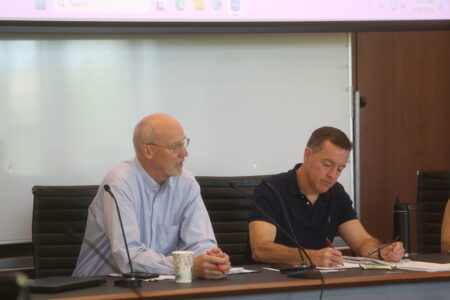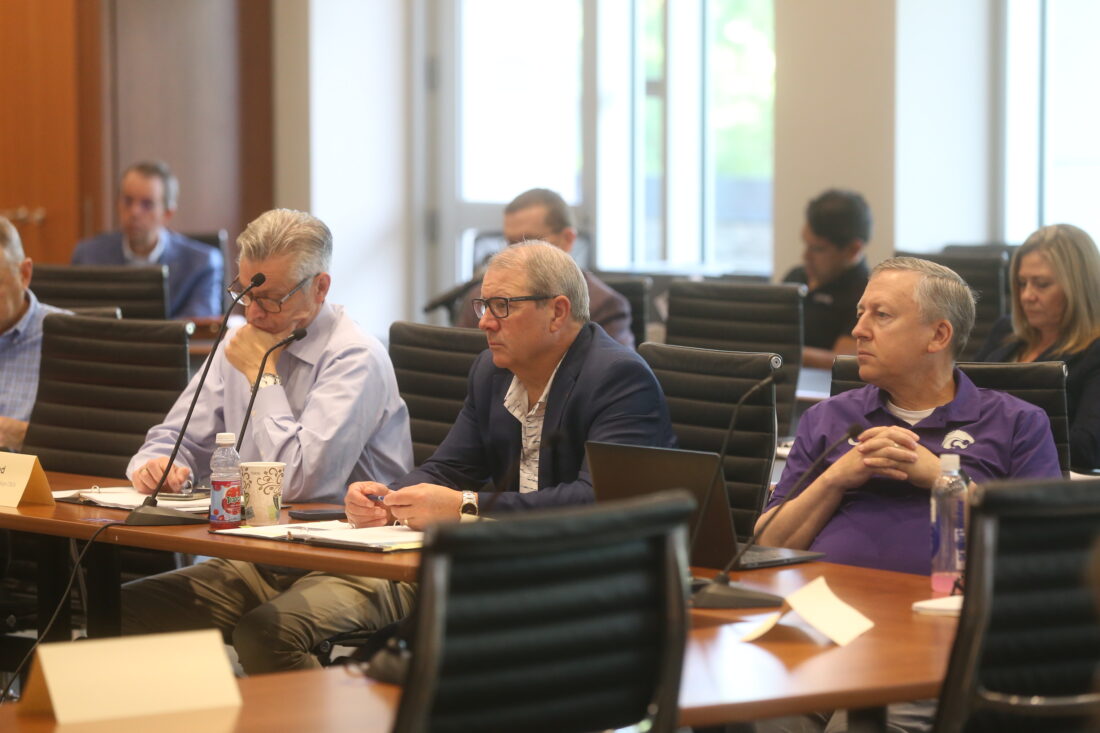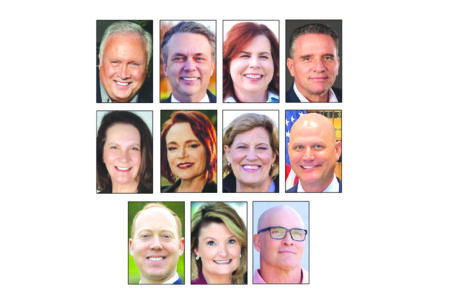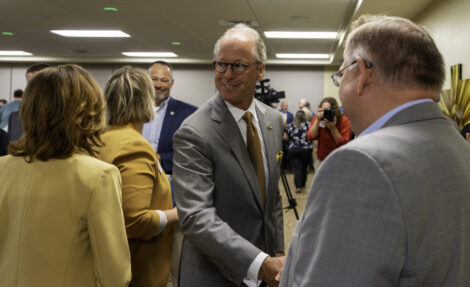As state lawmakers question the need for tenure, Regents want to review professor ‘workload’ policies
Higher ed leaders say they must be ready to defend tenure next legislative session

photo by: Chad Lawhorn/Journal-World
Blake Flanders, president and CEO of the Kansas Board of Regents, and Blake Benson, chair of the Regents, are pictured at the organization's annual retreat on July 30, 2025 at Kansas State University.
A hotly debated topic in the Kansas Legislature may soon produce a hotly debated topic in faculty lounges: How much work should a university professor be required to do?
The Kansas Board of Regents plans to soon undertake a review of faculty “workload policies” at the University of Kansas and other state universities, the Regents informally decided at their annual retreat on Wednesday.
Regents acknowledged that one of the reasons for the review is because there is a growing debate about whether university professors should still be offered tenure, a type of job status that makes it difficult for a university to fire a professor.
“I think we probably need to do a better job of talking with the general public about tenure because it is unique to this industry,” Blake Flanders, president and CEO of the Kansas Board of Regents, said in a brief interview.
Regents may have an even more specific audience in mind: Kansas lawmakers.
A bill was introduced during the last legislative session that would largely eliminate the key protections of the university tenure system. The bill — HB 2348 — never got a vote in committee, but it also wasn’t killed. The bill will be waiting for legislators when they begin their next session in January.
“That bill is alive, and we know we are going to have this conversation coming up in the session,” KU Chancellor Douglas Girod told the Regents on Wednesday. “They made it very clear at the end of the session that we’re going to have this conversation.”

photo by: Chad Lawhorn/Journal-World
University of Kansas Chancellor Douglas Girod, center, is pictured with Wichita State President Richard Muma, left, and K-State President Richard Linton, right, on July 30, 2025 at the Kansas Board of Regents’ annual retreat.
Several officials at Wednesday’s retreat, which was held at Kansas State University, said they are hopeful that reviewing and modifying the workload policies will send a strong message to lawmakers that higher education leaders hear their concerns about the tenure system.
Opponents of tenure laws across the country have argued tenure makes it too difficult to fire poor employees, and that the quality of universities suffer as a result.The workload polices can be a key part of a tenure system because they spell out expectations that professors need to meet during the course of a year.
Rusty Monhollon, vice president of academic affairs for the Regents, told the board that the review process likely will “add an important level of accountability for our institutions.” Monhollon said a review of workload policies will seek to ensure fair treatment of faculty members across various universities, reduce disputes over workload expectations, increase consistency in expectations, help improve performance evaluations, and serve as a valuable tool in helping lawmakers understand the staffing needs of universities, among other items.
Monhollon said his office is not envisioning a single workload policy for all public universities in the state. Rather each university could have its own workload policy — which is currently the case — but the Kansas Board of Regents likely would set more parameters that each school’s policy must fall within.
KU Provost Barbara Bichelmeyer said it would be important that the Regents recognize there are significant differences between the state’s public universities, thus workload policies also would likely be different.
“We do have good stories to tell, and so I look forward to the accountability and reporting aspects of this,” Bichelmeyer said.
Bichelmeyer, though, said it also will be important to remind faculty members that this review is being done in the spirit of protecting the tenure system, which is widely regarded by faculty members as a bedrock of their profession.
Several officials on Wednesday acknowledged the workload review process could produce angst among faculty members at the various universities.
“I think any of us, if they say we want to look at a workload policy, you know, there might be angst there,” Flanders said. “We look forward to their input. We’re going to be listening to faculty.”
Of note to faculty members and supporters of the tenure system, Regents had no discussion at Wednesday’s retreat of backing away from the tenure system. Girod, in an interview with the Journal-World, said any diminishment of the state’s tenure system would put Kansas at a severe disadvantage when trying to recruit talented professors.
While there has been conversations in many statehouses across the country of ending or weakening tenure laws, no state has yet eliminated the system, Girod said.
“States are doing different elements around tenure, but to date, no one has taken that step, and I certainly don’t want Kansas to be the first,” Girod said.
Girod said it is important to recognize that the tenure system in America was created because leaders recognized that “by definition, scholarly activity is critical thinking and critical thinking challenges constant, common ideas,” and “that opens you up to challenge from people who disagree with you.”
The protections of tenure make it less likely that scholars are unfairly punished by those in power because they disagree with a scholar’s ideas. Opponents of tenure, however, have argued those protections are unnecessary because the First Amendment adequately protects the free speech rights of scholars.
On Wednesday, Girod said, from his view, the tenure system has produced “beautiful” results for the advancement of knowledge.
“Really, the beautiful thing that has happened in the United States is we’ve been able to advance science, medicine and the arts through that model in a way that has also protected from profound political interference,” Girod said.
Girod, though, also acknowledged that there is a significant perception among the general public that the tenure system simply produces “jobs for life” for professors. Girod said the higher education industry needs to do a better job of explaining that tenure is more about recognizing academic achievement rather than providing career guarantees.
Regents, however, were provided some basic data on the tenure system in the state, and those numbers showed that large numbers of faculty members who apply for tenure are granted the status.
Between 2015 and 2025, about 3.5% of applicants who applied for tenure in the state university system were denied, Monhollon told Regents. However, that number doesn’t take into account that there are significant numbers of faculty members who leave before they ever reach the point of becoming eligible to apply for tenure, which can take up to seven years of service at a university. Systemwide numbers on the number of faculty members who leave before applying for tenure weren’t provided, but Monhollon said during the last 10 years there had been 115 faculty members leave before applying for tenure.
Once a faculty member has been granted tenure, a little more than 3.5% percent of professors receive an unsatisfactory review and are placed on an improvement plan, Monhollon said. Details on how many actually ended up being terminated from their position were not provided, but Monhollon told Regents the number was a “small percentage.” But he also added that during the last decade about 1,400 tenured faculty left their universities for reasons ranging from retirement to resignation.
At their Wednesday retreat, Regents took no official action to start the review process of workload policies. That was in large part because the retreat was not an actual business meting, so no votes could be taken. Based on Wednesday’s discussion, it is likely the task of workload policy review will be included on the list of annual goals for the Regents, which will be voted on at the board’s September meeting.
.






